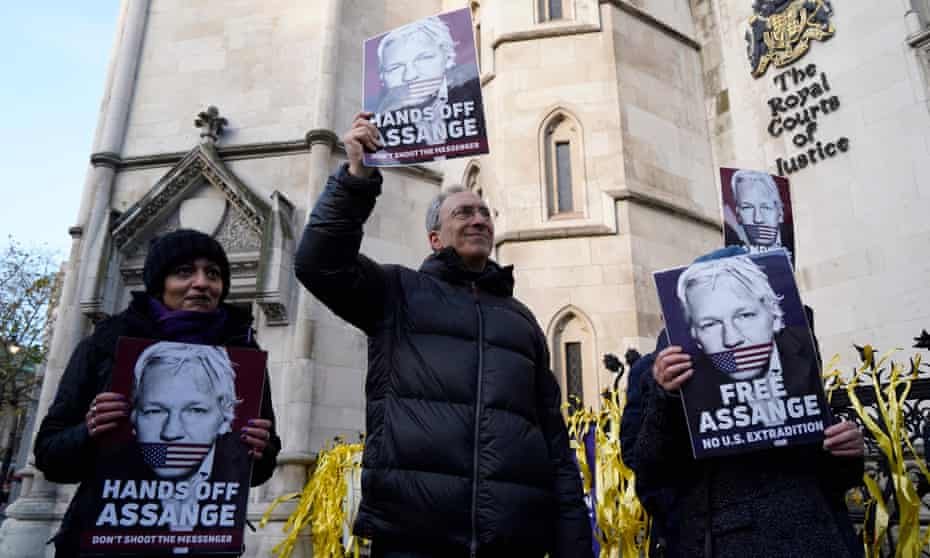WikiLeaks co-founder’s fiancee says appeal will be launched, as Amnesty International says decision is a ‘travesty of justice’

The high court has declared that Julian Assange can be extradited to the United States, overturning a decision from earlier this year.
The ruling represents a big setback for WikiLeaks co-founder Julian Assange’s efforts to avoid extradition to the United States to face espionage accusations, however his girlfriend has already stated that an appeal will be filed.
The senior judges discovered that a district court earlier this year based her ruling on the possibility of Assange being confined in solitary confinement if extradited.
However, in a Friday judgement, they agreed with the US authorities after receiving a near-unprecedented bundle of assurances that Assange would not be subjected to the most severe sanctions, either before or after his conviction, unless he committed an act in the future that warranted them.
Lord Burnett said: “That risk is in our judgment excluded by the assurances which are offered. It follows that we are satisfied that, if the assurances had been before the judge, she would have answered the relevant question differently.”
He added: “That conclusion is sufficient to determine this appeal in the USA’s favour.”
Allowing the appeal, the judges ordered that the case be remitted to Westminster magistrates court with a direction that a district justice send the case to the secretary of state, who will decide whether Assange should be extradited to the US.
- Two people have been detained for conspiring to sell a 16-year-old boy for GHC800,000.
- Omicron has spread to 57 countries, but WHO believes it’s too early to know if the variety is more contagious.
Responding to the decision, Stella Moris, Julian Assange’s fiancee, said: “We will appeal this decision at the earliest possible moment.”
She described the high court’s ruling as “dangerous and misguided” and a “grave miscarriage of justice.”
“How can it be fair, how can it be right, how can it be possible, to extradite Julian to the very country which plotted to kill him?” she said.
The case against the 49-year-old relates to WikiLeaks’s publication of hundreds of thousands of leaked documents about the Afghanistan and Iraq wars, as well as diplomatic cables, in 2010 and 2011.
Alarm at the high court ruling was expressed by advocates of press freedom, with Amnesty International describing the ruling as a “travesty of justice”.
Nils Muižnieks, Amnesty International’s Europe director, said: “By allowing this appeal, the high court has chosen to accept the deeply flawed diplomatic assurances given by the US that Assange would not be held in solitary confinement in a maximum security prison.”
“If extradited to the US, Julian Assange could not only face trial on charges under the Espionage Act but also a real risk of serious human rights violations due to detention conditions that could amount to torture or other ill-treatment. The US government’s indictment poses a grave threat to press freedom both in the United States and abroad.”
Rebecca Vincent, director of international campaigns at Reporters Without Borders and the organisation’s UK bureau director, tweeted: “This is an utterly shameful development that has alarming implications not only for Assange’s mental health, but also for journalism and press freedom around the world.”
The high court was told earlier this year that blocking Assange‘s removal from the UK due to his mental health risked “rewarding fugitives for their flight”.
James Lewis QC, for the US, said the district judge based her decision on Assange‘s “intellectual ability to circumvent suicide preventive measures”, which risked becoming a “trump card” for anyone who wanted to oppose their extradition regardless of any resources the other state might have.
The assurances offered by the US in a diplomatic note in February included one that Assange would not be subject to “special administrative measures” or held at a maximum security “ADX” facility, such as one in Florence, Colorado, either during a pretrial period or after any conviction.
The US also said it will consent to an application by Assange, if he is convicted, to be transferred to his native Australia to serve any sentence and that he would receive appropriate clinical and psychological treatment while in US custody.
The US assurances were described in the ruling by the high court judges on Friday as “solemn undertakings offered by one government to another.”
Lord Burnett of Maldon, lord chief justice, and Lord Justice Holroyde added in their ruling: “There is no reason why this court should not accept the assurances as meaning what they say. There is no basis for assuming that the USA has not given the assurances in good faith.”



